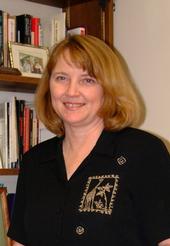

Rita Quillen
I can vividly recall the day I discovered Appalachian poetry. I had worked up the nerve to show some poems to my English teacher at Mountain Empire Community College in Big Stone Gap, Virginia, Mr. Van Rose, after he'd bragged on my writing abilities. "These remind me of Fred Chappell," he said, after reading them, and I said, "Who?"
The only Appalachian writer I'd ever heard of at that time was Kentucky's Jesse Stuart. Rose proceeded to fill me in on Chappell, his work, and his growing critical acclaim, and then sent me off immediately to the library. When I looked up Chappell's name in the card catalog, I discovered the names Jim Wayne Miller and Jeff Daniel Marion listed with the same subject heading: Appalachian Poetry. To make a long story short, several hours later I finally looked up after reading through the little chapbooks of all three poets. It was a life-changing afternoon for me. I walked out of that library with a new joy and a new commitment to my writing. I had found my tribe.
Here were poets who felt intimately connected to me, my life, my world, my family. I realized I was part of something much larger, some profound new energy rippling out of this very ground. Today, 30 years after that fateful afternoon, I'm proud to introduce a fresh, lively sampling of poems from local and regional poets, reflecting the energy, vitality, and momentum of the literary scene in the area. Despite what trips to your local chain bookstore might tell you, poets are still thriving, productive, and provocative as ever, challenging us to think, to remember, to treasure, and to question.
Because poets and poetry have been relegated to the fringes of society and the publishing world today, (the blame for that lies with poets themselves, academia, and the whole publishing industry, but we'll leave that discussion for another day) you won't see these writers on Oprah or The New York Times bestseller lists. But what you will see here is art-something true, often brave, powerfully felt, and powerfully rendered. Whether it's dealing with the loss of loved ones or lost love, confronting a cancer diagnosis, painting a portrait of a colorful character, telling a family story, or exploring the tremendous natural beauty of the region, these poets are very much of this place. Their poems are the place where geography meets history meets culture, resulting in an artistic environment not quite like any other. Struggling with their day jobs and family responsibilities just like everyone else, these poets have still made and kept a commitment to a calling.
The Appalachian region as a whole, including the Tri-Cities area, is very lucky to have nurtured such poets and many more just like them. This remains fertile ground for writers and their ideas, big and small, and promises to nurture a significant body of literature for years to come.
###
Let the Words Fall Where They May
by Rita Sims Quillen
Let darkness come
With only a star here or there
A doughy biscuit moon
Unfazed by clouds passing by.
Let storms slash across treetops
Lightning spiking to the ground
Thunder rumbling through the walls
Knocking limbs to earth.
Let snow pile the roadbank
Remove all color from the world
Freeze long tears from my rooftop
The snowflakes disappearing instantly in my hand.
Let the Words come like an ache
Moving through my timid hand
Unafraid of stormy night and black and white
The ink a ragged tracing of my life's map.
ABOUT THE POET:
Rita Quillen lives with her husband Mac on Early Autumn Farm in Scott County, Virginia, and she teaches at Mountain Empire Community College in Big Stone Gap. In addition to her books of poems, she is the author of a book of critical essays, Looking for Native Ground: Contemporary Appalachian Poetry, and an unpublished novel entitled Hiding Ezra. Her work has been included in several critically acclaimed anthologies, including Bloodroot: Reflections of Place by Appalachian Women Writers; Listen Here: Appalachian Women Writers; Appalachia Inside Out; and the Appalshop public radio series, "Tell It On The Mountain." A popular workshop leader, she has led many writing workshops, including the Hindman Settlement School Appalachian Writer's Workshop, the Alabama Writer's Conclave, and the Radford Summer Program in Appalachian Studies.
###
Meet the poets featured in the April issue of A! MAGAZINE FOR THE ARTS, read their poetry,
by following the links below:
-- Jane Hicks
-- Felicia Mitchell
-- Delilah O'Haynes
-- Neva Bryan
-- Rees Shearer
-- Gretchen McCroskey
-- Benjamin Dugger
-- Warren Meredith Harris
-- David Winship
-- Henry McCarthy
-- Lena Cantrell McNicholas
-- Samuel Miller, M.D.
-- Poetry Events
-- Arts All Around: A Day Without Poetry by Barbara-lyn Morris
-- Arts for Youth Spotlight: ETSU Senior Researches Japanese Poet